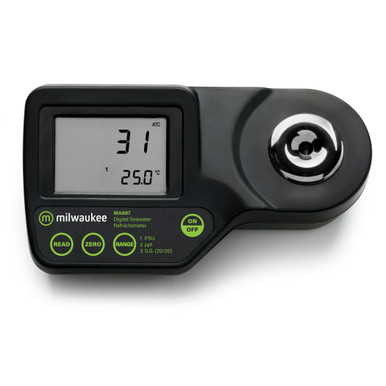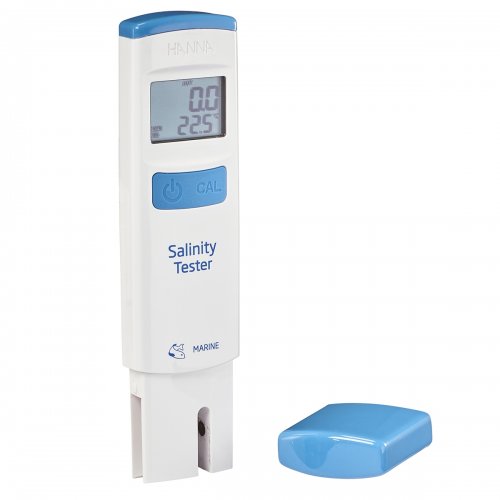So i have been in the hobby a long, long time but I am far from an expert. i say this because I still hang onto doing some things "the old way". For years I have used the swing arm hydrometer to test my salinity. I have owned a refractometer but never really used it much. Again my tank is working using the swing arm so why change things. Thinking maybe it's time to reevaluate my practices I decided to employ using my refractometer. After testing, the refractometer reveals a salinity of 1.032. I recalibrated using RODI water to make sure it was zeroed out. I happen to have a floating hydrometer as well. It measures my water at 1.025. My floating arm hydrometer reads 1.0245. Before I put the refractometer back on the shelf I will pick up some calibrating fluid as soon as I am able to pick some up.
-
Folks, if you've recently upgraded or renewed your annual club membership but it's still not active, please reach out to the BOD or a moderator. The PayPal system has a slight bug which it doesn't allow it to activate the account on it's own.
You are using an out of date browser. It may not display this or other websites correctly.
You should upgrade or use an alternative browser.
You should upgrade or use an alternative browser.
Salinity
- Thread starter Coral Reef To Classroom
- Start date
Your livestock has probably just gotten used to the higher salinity. Retest after calibrating, but I recommend slowly (over a period of several days) bringing your SG down to 1.026. If for no other reason than to make life easier on any new fish/corals/inverts you add to the tank.
Diana is correct. Some are calibrated at zero others at 1.026 just about all modern ones are at 1.026. I see very few calibrated at zero anymore
as far as your swing arm goes. My opinion is you can’t throw it away quick enough. Swing arms have way to many things that can go wrong. Even the tiniest air bubble can give you a false reading not to mention friction of the plastics rubbing or holding it at an off angle. A calibrated refractometer is Extremely accurate
as far as your swing arm goes. My opinion is you can’t throw it away quick enough. Swing arms have way to many things that can go wrong. Even the tiniest air bubble can give you a false reading not to mention friction of the plastics rubbing or holding it at an off angle. A calibrated refractometer is Extremely accurate
The directions for this refractometer states to use distilled water for calibration.
I was told never to use rodi to calibrate a refractometer.
i have always used calibrating fluid.
I always use calibration fluid, but afterwards double check with RODI just to see what reading I will get. It's always the same: 35ppt (calibration fluid) = 0ppt RODI. The one time the RODI reading was a little off the TDS was not 0.
DangerDave
NJRC Member
You guys are working too hard, just sayin....

 milwaukeeinstruments.com
milwaukeeinstruments.com

Milwaukee MA887 Digital Salinity Refractometer
The Milwaukee Instruments digital salinity refractometer is ideal for saltwater aquarium professionals and enthusiasts.
No I don’t... I use this and love it works great very fast no wait no collecting water and I can check all 7 tanks bang bang bang. It’s awesomeYou guys are working too hard, just sayin....

Milwaukee MA887 Digital Salinity Refractometer
The Milwaukee Instruments digital salinity refractometer is ideal for saltwater aquarium professionals and enthusiasts.milwaukeeinstruments.com
Hanna version is what I am using

DangerDave
NJRC Member
I’ve seen those, super cool. I’ve been secretly hoping my Milwaukee will die so I can get one of those!
Hockeynut
NJRC Member
Ha I almost pulled the trigger on that yesterday. I guess with your testimonial to how good it is I will pull away. Thanks for the in house review.I can tell ya. Haven’t had a problem. And I check now and then with my refracometer and it’s very accurate. I have recalibrated a few times just to be sure
I think my frustration surfaced because I had two instrument reading nearly the same while my refractometer showed a much higher reading. I wasn't able to find calibration fluid locally so I picked up distilled water which is stated to be used in the directions. By the way my refractometer is made by Aqualife. Checked calibration with distilled water, it's at 0. Checked my reef tank again. It's at 1.031. Should I hang a bag of distilled water in the tank to match the temperature and calibrate again? Do I take the refractometer as the correct measurement moving forward?
Matching temperature is more for water changes, when you test the water before adding it to the tank, having a heater in it helps reduce shock and get a more accurate salinity reading. I am unsure if it affects the distilled water.
If the lfs is open, you can get it double checked there if your not feeling confident about the 1.031, but I'd very slowly try to get the number down as higher salinityis worse than lower. Keep as eye on the tank to see how everyting reacts.
If the lfs is open, you can get it double checked there if your not feeling confident about the 1.031, but I'd very slowly try to get the number down as higher salinityis worse than lower. Keep as eye on the tank to see how everyting reacts.

